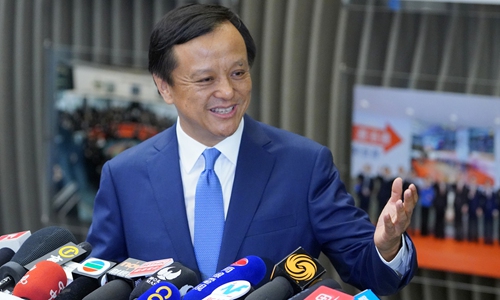
The Executive Director of the Stock Exchange of Hong Kong Li Xiaojia speaks in front of the media during Alibaba's listing on the Hong Kong stock exchange on November 26, 2019. Photo:CNSPhoto
Chinese mainland-based technology giants that recently went public in Hong Kong are expected to be included in the stock link programs between the mainland and Hong Kong, director of Hong Kong Exchanges and Clearing Charles Li Xiaojia said.
His comments are a signal that Chinese mainland investors would be able to trade the shares of Alibaba and JD.com via the stock link programs, analysts say.
According to Li, it's just matter of time for overseas-listed, mainland-based companies that shift to the Hong Kong bourse to be included in the mainland-Hong Kong stock link programs, though he didn't reveal any timing for the reform, reported sina.com.cn.
"We haven't reached a deal with the mainland stock exchanges, so it's hard to predict the timetable for the inclusion," Li said.
Li's comments sent a message that it's highly probable that Alibaba and JD.com, two mainland tech giants that went public in Hong Kong recently, would be included in the stock link programs, experts said.
Alibaba was reportedly blocked from being included in the Hong Kong-mainland stock link programs earlier this year because of secondary listings and weighted voting rights.
"In terms of financial conditions, companies like Alibaba and JD.com are qualified for the inclusion," said Li Daxiao, the chief economist at Shenzhen-based Yingda Securities. "I think the mainland stock exchanges want to make sure that the connection between secondary listings and mainland markets can be smooth and don't trigger too much volatility," he told the Global Times.
He also said that there might be some technical issues that involve secondary listings to be included in the stock link programs, but they will only be a temporary hindrance to the inclusion of companies like Alibaba.
Xi Junyang, a professor at Shanghai University of Finance and Economics, said that the chances are great for such inclusion amid a trend for US-listed Chinese companies to shift their listings and when the mainland is pushing for financial opening-up.
He predicted that the mainland will further broaden its links with the Hong Kong stock market by incorporating more companies into the stock link programs and further lifting the trading quota.
But as the mainland already has reforms to implement, such as expanding experiments of the registration-based IPO system, so reforms of the stock link programs will likely be carried out in 2021 instead of this year, Xi said.
Charles Li Xiaojia also said that Hong Kong welcomes qualified companies listed overseas to list on the Hong Kong bourse, whether they are primary or secondary listings.
"We believe they chose to return because the US market environment can't bring enough confidence," he said, but added that Hong Kong does not welcome companies that were forced to delist from the US because of their own flaws.
The Hong Kong bourse ranked first globally in terms of IPO proceeds in 2019, completing 169 IPOs and raising funds of HK$314.5 billion ($40.6 billion), cementing its position as the world's leading IPO hub.


